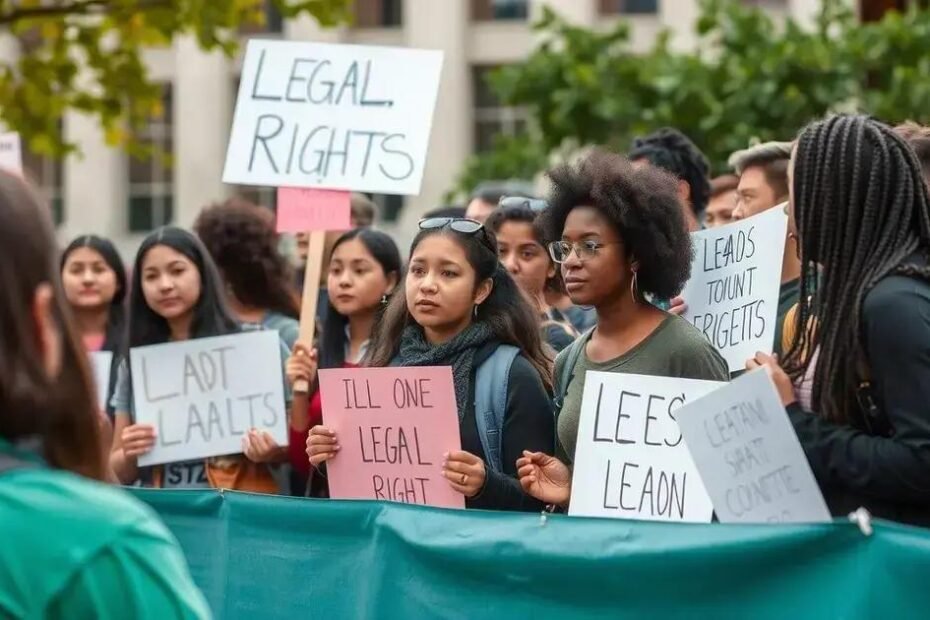Legal assistance programs for student demonstrators provide critical support, ensuring students understand their rights and receive help during protests, which can lead to successful outcomes and protect them from legal repercussions.
Legal assistance programs for student demonstrators are essential in today’s climate. These programs help protect your rights during demonstrations, providing guidance when it’s needed most. Have you ever wondered how they can make a difference?
Understanding legal assistance programs
Understanding legal assistance programs is crucial for students who wish to demonstrate their rights. These programs provide essential support for individuals navigating the complexities of legal systems, particularly during demonstrations. Knowing what these services entail can empower students to participate more actively and confidently.
What are legal assistance programs?
Legal assistance programs are designed to offer support and guidance to those facing legal issues. For student demonstrators, these programs often include:
- Free legal consultation
- Representation during legal proceedings
- Access to educational resources about legal rights
Many universities have established legal aid offices to assist students in understanding their rights during protests. These offices are staffed by experienced lawyers and trained volunteers who ensure students are informed before they engage in demonstrations.
Importance of legal assistance during demonstrations
Legal assistance is vital during protests, as it helps protect students from potential repercussions. Whether it’s understanding how to interact with law enforcement or knowing their rights, students rely on legal aid to navigate challenging situations.
- Protects against wrongful arrests
- Provides knowledge about peaceful protest rights
- Supports representation in case of legal issues
With the support of legal assistance programs, students can focus on their causes instead of fearing legal challenges. Armed with this information, student demonstrators can take a stand for their beliefs while minimizing risks associated with protests.
Benefits of legal aid for student demonstrators
Benefits of legal aid for student demonstrators extend beyond just legal representation. These services empower students by providing knowledge and confidence to stand up for their rights during protests.
Access to experienced lawyers
One of the main advantages of legal aid is access to experienced lawyers. They understand the complexities of protest laws and can offer advice tailored to students. This guidance is essential for navigating legal challenges effectively.
- In-depth understanding of students’ rights
- Support in communicating with law enforcement
- Representation if faced with legal actions
With skilled lawyers backing them, students can protest with assurance. Knowing that there is legal support available can significantly reduce anxiety about potential repercussions.
Providing crucial information
Legal aid also plays a vital role in educating students about their rights. Many programs offer workshops and informational sessions that cover:
- What to do if approached by police
- Legal rights during a demonstration
- How to report any violations of rights
This information helps students feel more prepared and capable during demonstrations. With a better understanding of their rights, they can focus more on their causes rather than worrying about legal troubles.
Having strong legal support can prevent misunderstandings and help clarify what students can or cannot do during protests. This knowledge not only aids in better planning but also builds a stronger community of informed activists.
How to access legal assistance programs

How to access legal assistance programs is a vital question for student demonstrators. Knowing the steps to obtain legal aid can make a significant difference in stressful situations. Fortunately, there are structured ways to access these resources effectively.
Identify available programs
The first step is to identify the legal assistance programs available at your school or in your community. Many universities provide legal aid offices specifically designed for students. These offices often offer:
- Free or low-cost legal consultations
- Workshops on legal rights and responsibilities
- Access to volunteer lawyers and law students
In addition to university resources, non-profit organizations and community legal clinics may offer assistance. Checking websites of local organizations can help you discover additional options.
Contact your legal aid office
Once programs have been identified, it’s important to make contact. Most legal aid offices can be reached through their websites, phone numbers, or in-person visits. Here are some tips for reaching out:
- Prepare specific questions about your situation
- Gather necessary documents or information related to your case
- Be clear about what type of assistance you need
This preparation helps the legal team understand your situation better and provide the support you need more efficiently.
After contacting the office, you might be invited to an initial consultation. This meeting will help assess your needs and outline possible actions. It’s an opportunity to learn more about the services provided and how they can assist you.
Always remember that accessing legal assistance is your right. Being proactive in seeking help is crucial, especially when you are part of a demonstration advocating for change.
Legal rights of student demonstrators
Legal rights of student demonstrators are essential for ensuring safe and peaceful protest experiences. When students take to the streets to voice their opinions, understanding their rights helps protect them from potential legal issues.
First Amendment rights
In the United States, the First Amendment grants students the right to free speech and assembly. This means students can express their opinions through protests without fear of government repression. Some key points to remember about these rights include:
- The right to gather peacefully
- The right to express opinions publicly
- The right to distribute literature or materials related to the demonstration
However, while these rights are protected, students must ensure their protests remain peaceful and orderly to avoid possible legal consequences.
Rights when interacting with law enforcement
Understanding how to interact with law enforcement is crucial for student demonstrators. If approached by police, students should know their rights. Important rights include:
- The right to remain silent when questioned
- The right to ask if one is free to leave
- The right to legal representation during questioning
Students should also be aware that they have the right to film or document police activity during protests. This documentation can serve as valuable evidence in case of any misunderstandings or disputes.
By knowing their rights, students can help ensure their voices are heard while minimizing risks during demonstrations. Staying informed empowers students to protest confidently and protect themselves from unlawful actions.
Case studies and success stories
Case studies and success stories play a crucial role in demonstrating the effectiveness of legal assistance programs for student demonstrators. These real-life examples highlight how students have successfully navigated challenges through the support of legal aid.
Successful protests backed by legal aid
Many students have experienced positive outcomes during protests thanks to the guidance of legal assistance. One notable case involved a group of students who organized a demonstration on campus to advocate for environmental policy changes. With the help of a legal aid office, they:
- Received training on their rights as demonstrators
- Ensured compliance with local laws
- Felt confident interacting with law enforcement during the event
Because of this preparation, the demonstration proceeded smoothly, and the students were able to communicate their message effectively, resulting in a meeting with university officials to discuss their proposals.
Impact of legal guidance on outcomes
Another powerful case involved a student who was arrested during a protest against tuition hikes. With the assistance of a legal aid attorney, they challenged the arrest. The lawyer helped prove that the arrest violated the student’s rights under the First Amendment. This case resulted in the dismissal of charges and led to policy changes regarding how the university handles student demonstrations.
These success stories illustrate the significance of legal assistance programs in empowering students. By understanding their rights and having legal support, students can make their voices heard without the fear of unwarranted repercussions. It’s essential for all student demonstrators to know that help is available and that they can achieve their goals through careful preparation.
FAQ – Frequently Asked Questions about Legal Assistance Programs for Student Demonstrators
What types of legal assistance are available for student demonstrators?
Students can access free or low-cost consultations, legal representation, and workshops on their rights during protests.
How can I find legal aid resources at my university?
Check your university’s website for legal aid offices or student support services that provide information on available programs.
What should I do if I get approached by police during a protest?
Stay calm, remember your rights, and it’s important to assert your right to remain silent if needed. Always ask if you are free to leave.
Can legal aid help if I face charges from participating in a protest?
Yes, legal aid programs can provide you with representation and assist you in challenging any unfair charges.

